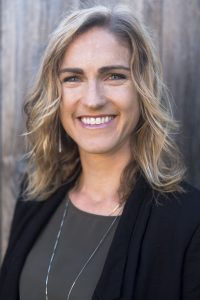THI Welcomes Saskia Dunkell, New Research Program Manager

Saskia Nauenberg Dunkell joined The Humanities Institute in May as our new Research Program Manager. Saskia is a humanistic social scientist with a background in international program management. While completing her PhD in sociology at UCLA, she directed Global Youth Connect’s Colombia Human Rights Delegation and worked at the International Peace and Security Institute’s The Hague Symposium on Post-Conflict Transitions and International Justice. Saskia is a native of Santa Cruz and will be bringing her experiences home to advance the Expanding Humanities Impact and Publics project at UC Santa Cruz.
THI spoke with Saskia about the academic world she’s arriving from, her relationship to our county, and what she envisions for her new role at The Humanities Institute.
We’re thrilled to welcome you here to THI, at the end of spring 2019, as our new Research Program Manager! You’re coming here with a brand new PhD. Can you tell us about your scholarly work, and what you were doing before you joined us at UC Santa Cruz?
Thank you, I am very excited to be at THI! My research examines how governments establish and implement transitional justice—judicial and non-judicial measures used to address human rights violations in the wake of mass violence. I conducted extensive fieldwork in Colombia during the 2012-2016 peace talks between the Colombian government and the FARC. When I finished my PhD in September 2018, I was selected as an inaugural Research Affiliate at the UCLA Promise Institute for Human Rights.
You grew up in Santa Cruz so you’re not a stranger to this part of the California coast. How would you describe your relationship to Santa Cruz and the surrounding area? How does it feel to be returning here (and after how long)?
Santa Cruz is home! I appreciate this special community more than ever. I’ve learned a lot spending time in other parts of the world—I moved to Seattle after high school, served as a Peace Corps Volunteer in the Kingdom of Tonga for 2+ years, and lived in Southern California, the Netherlands, and Colombia to pursue my research. After being away for more than 15 years, working at UC Santa Cruz is a terrific opportunity to bring these experiences back to my hometown. It still feels like a dream to be here! I have to pinch myself every time I ride my bike to campus through the redwoods overlooking the Pacific.
You’re transitioning from a scholarly workload and ethos to a more university-administrative one. What do you think the differences will be, as well as the areas of overlap?
So far, I really like that my new position will involve much more collaboration than my academic studies, which at times felt very solitary. I am excited to work with diverse groups of faculty, staff, and students to advance programs in the humanities. Having recently completed my PhD, I can understand graduate students’ experiences and help bridge between scholars and administrators. Meanwhile, my new role will overlap with my longstanding interest in public scholarship. I’ll be involved in planning this year’s “Questions that Matter” series, a terrific forum for humanities scholars to tackle pressing questions and engage with broader communities.
Such a transition from PhD to career is the focus of our PhD+ Workshop series, which aims to help graduate students open up their job horizons. We’re interested in what you’ll be able to contribute and share in this regard! Do you intend to continue the PhD+ series, and if so, do you have any thoughts about future directions?
Definitely, I am excited to continue the series. PhD+ workshops help graduate students effectively communicate their expertise to different audiences and think about the value of their humanities doctorates for a range of positions. The program also equips students with skills to thrive during their PhDs—participants learn about academic publishing, grant writing, and course development (to name a few). I am eager to build on previous sessions and incorporate activities beyond the day of the workshop. For example, I would love to have a session on op-eds, where students bring in a short paragraph of ideas to revise during the meeting. I am also eager to invite more UC Santa Cruz humanities alumni. The Humanities Institute is celebrating its 20th anniversary next year, and the PhD+ series is a wonderful way for current students to connect with Humanities graduates pursuing inspiring careers.
You’ll also be working with our THI Fellows, including Public Fellows. What are you most excited about in your new role? Any plans for new projects or areas that you’d especially like to focus on?
I am hoping to expand THI’s partnerships with local organizations. Having grown up here, I am in a good position to help foster positive connections between the university and Santa Cruz community. The Public Fellows program is an incredible opportunity for both graduate students and partner organizations, I wish it had been an institutionalized part of my PhD. During my academic studies, I was able to work with Global Youth Connect, the International Peace and Security Institute, and the Alliance for Peacebuilding. These experiences showed me firsthand how research, teaching, and jobs outside of the university can positively enrich and reinforce one another. I am especially excited about my role supporting the next generation of UC Santa Cruz graduate students and can’t wait to meet the THI Fellows!
